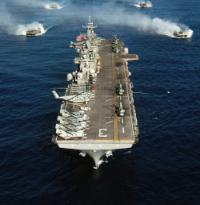ABOARD THE U.S.S. KEARSARGE -- There was something strange about the U.S.S. Kearsarge amphibious assault ship as she left Norfolk, Virginia, last week for a four-month South American cruise. Instead of the usual solid ranks of white-clad sailors lining her huge flight deck, the size of two football fields, there were hundreds of military medical personnel in the green, blue, gray or tan uniforms of the Canadian Army, the U.S. Army, the U.S. Air Force and the Brazilian and Dutch militaries -- not to mention scores of civilian aid workers in blue jeans and t-shirts. For decades, the U.S. Navy's roughly three-dozen amphibious ships have carried U.S. Marines across the world's oceans in response to crises. Today the Marines are embroiled in long land wars in Iraq and Afghanistan. So the empty amphibious ships have assumed a new role: hauling military and civilian humanitarians to developing countries as part of the Pentagon's emerging "soft power" strategy, delivering free medical care and economic assistance in order to "win hearts and minds" and solidify regional alliances. The new strategy was most famously expressed in Defense Secretary Robert Gates' November 2007 speech at Kansas State University, where he called for the United States to "integrate and apply all the elements of national power . . . strengthening our capacity to use 'soft' power."
Navy Ship Encounters Obstacles on South American ‘Soft Power’ Mission

